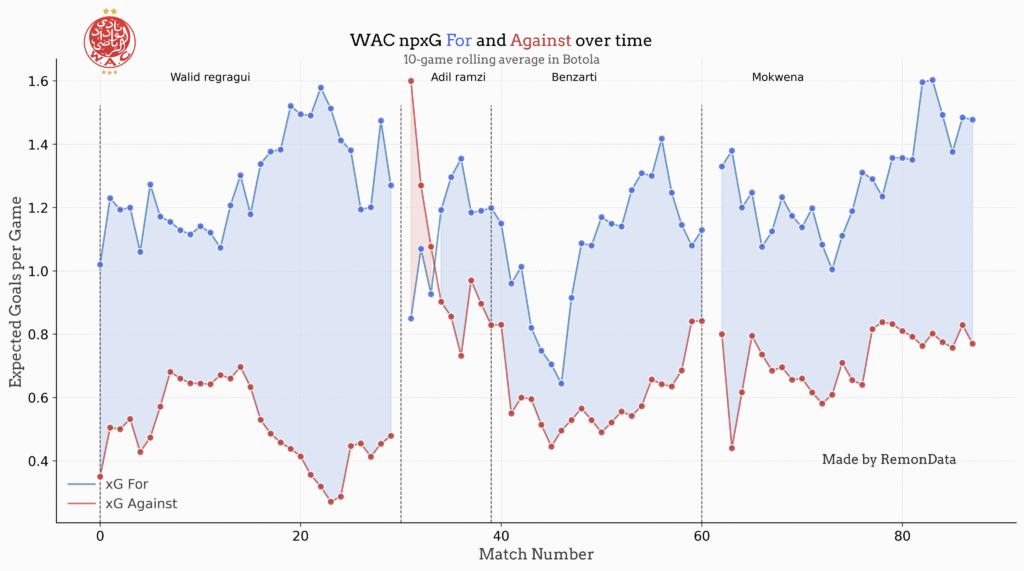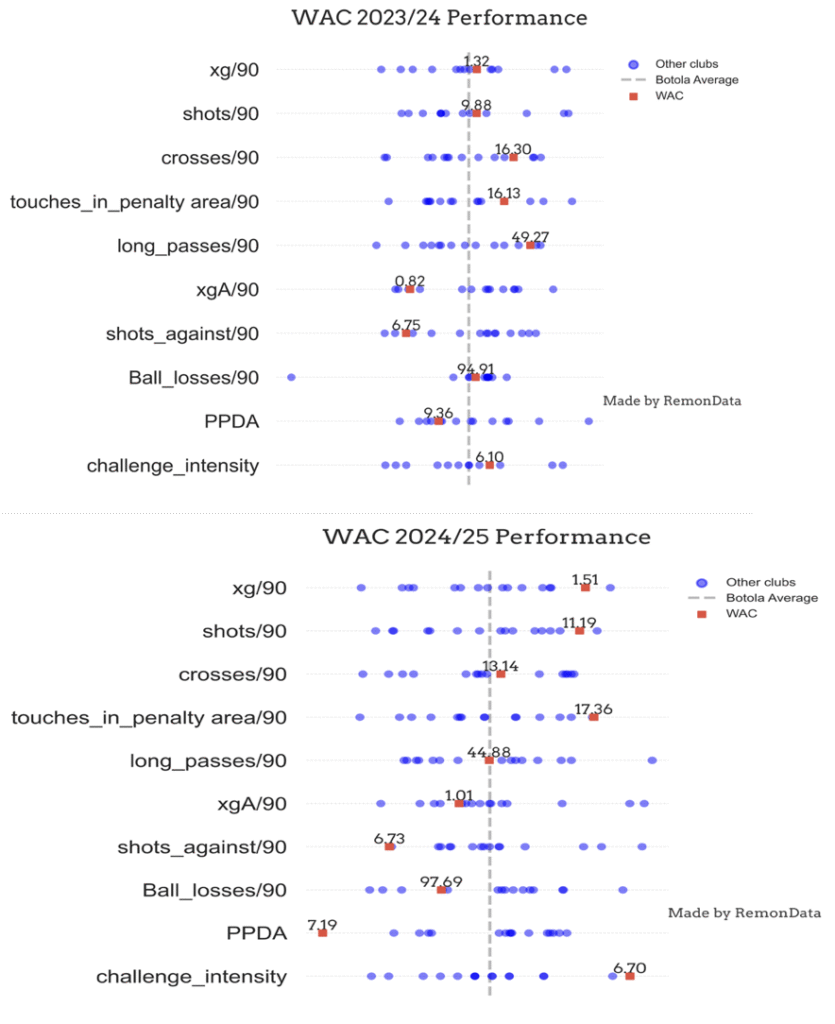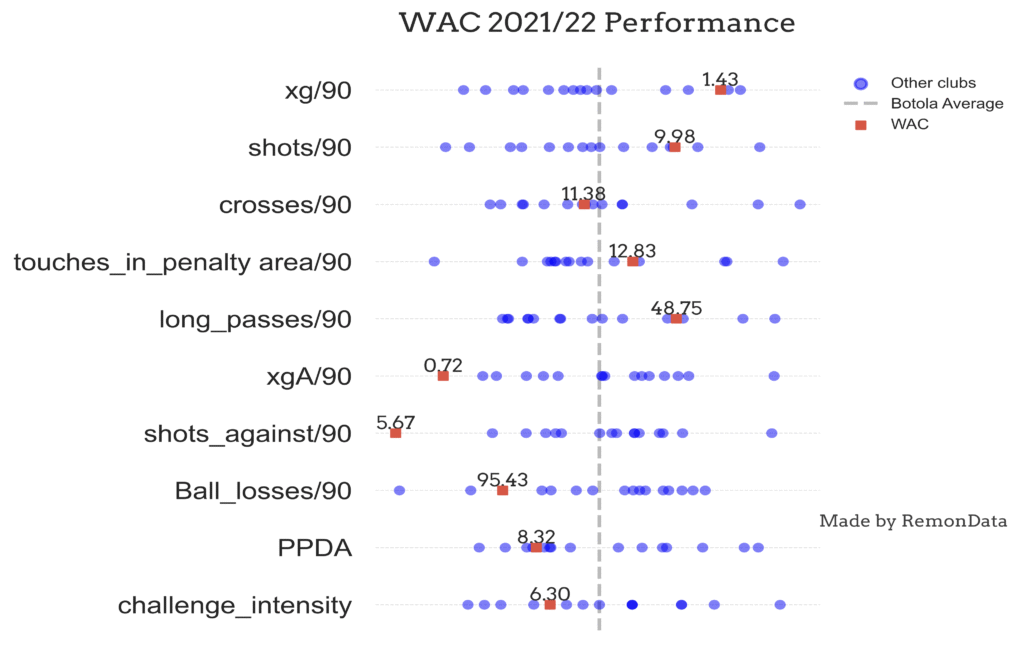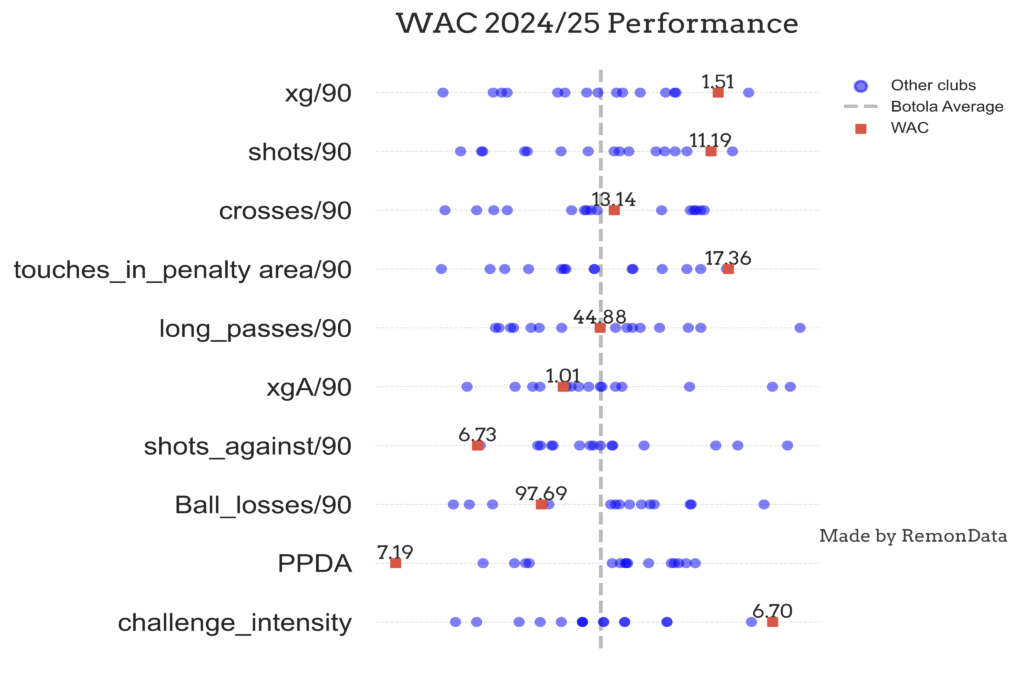When Wydad Casablanca lifted the Botola title in 2022 under Walid Regragui, it was the result of a team built on strong defensive foundations, pragmatic game control, and gradual offensive improvement. Two years later, under Rulani Mokwena, Wydad took a very different path: a bold revolution that brought more goals, more intensity— but ultimately left the team too exposed to reclaim its former dominance.

Looking at Wydad’s rolling 10-match averages for non penalty expected goals for and against across these seasons reveals the changes clearly.
Under Walid, Wydad’s xG For steadily rose through the year, starting from around 1.0 and peaking above 1.4 towards the decisive months, while their xG Against remained impressively low, often below 0.7, highlighting the side’s compact and disciplined defensive shape. The following transitional season under Adil Ramzi and Faouzi Benzarti, however, showed a volatile attacking output, with xG For frequently dropping below 1.0, combined with a worrying increase in xG Against toward 0.9,this tells the story of a team caught between different ideas: Ramzi’s offensive intentions and Benzarti’s traditional conservative methods: Inconsistent philosophy mirrored inconsistent performance.
When Rulani Mokwena arrived for the 2024/25 season, the graph took a very different shape: the xG For rose spectacularly, often around 1.5 per match — higher than Walid’s peaks — but xG Against also climbed consistently, frequently staying above 0.9. This told the story of a team that had dramatically improved its attacking output but had sacrificed defensive solidity along the way.
Comparing Styles:
Comparing Mokwena’s Wydad to the Transitional Year: Progress in Attack, Fragility in Defense

Comparing Mokwena’s Wydad to the previous 2023/24 transitional season highlights both the progress made and the vulnerabilities that remained. Offensively, there was a clear and impressive evolution: the team’s xG per 90 minutes increased from 1.32 to 1.51, and shots per game jumped from 9.88 to11.19.
Wydad under Mokwena also increased their presence in dangerous areas, with touches inside the penalty area rising from 16.13 to 17.36. Pressing intensity improved significantly too, as seen in a PPDA dropping from 9.36 to 7.19, indicating a more proactive defensive effort high up the pitch. The players were more engaged in duels, with challenge intensity increasing from 6.10 to 6.70. All signs pointed to a team that was more aggressive, dynamic, and ambitious compared to the previous season.
Yet defensively, the old problems not only persisted but worsened: xG Against rose from 0.82 to 1.01, meaning Wydad conceded better quality chances against them under Mokwena’s high-risk approach. Although shots against stayed roughly similar, the team’s vulnerability in transitions became clear. Ball losses also rose slightly, from 94.91 to 97.69 per game, underlining how a faster, more direct playing style exposed them when possession was lost. In essence, Mokwena’s Wydad became more dangerous to opponents — but also more dangerous to themselves.
Comparing Mokwena to Walid: The Missing Ingredients for a Championship:


The comparison between Rulani Mokwena’s Wydad and Walid Regragui’s title-winning 2021/22 side illustrates the crucial difference between excitement and efficiency.
Offensively, Mokwena’s team matched or even exceeded Walid’s figures: xG per match improved slightly from 1.43 under Walid to 1.51 under Mokwena, shots rose dramatically from 9.98 to 11.19, and touches inside the penalty area surged from 12.83 to 17.36.
Pressing intensity was higher too, with Wydad under Mokwena allowing fewer passes before applying pressure compared to Walid’s slightly more patient block. Yet the foundation that Walid’s Wydad was built upon — defensive control — was noticeably missing. Mokwena’s side conceded 1.01 expected goals per match compared to Walid’s remarkably low 0.72.
Ball security was tighter under Walid too, with fewer ball losses and better management of possession when protecting leads. Walid’s team understood when to slow the game down, when to protect their advantage, and when to attack selectively. Mokwena’s Wydad often played matches at full speed from start to finish, unable to consistently manage different game states, especially when ahead.
In the end, Rulani Mokwena’s Wydad represented a modernization of the club’s offensive approach. They created more, attacked faster pressed harder , creating more but conceding too much, unable to consistently control the rhythm of matches over 90 minutes, but football, especially in the high-pressure environment of African and Moroccan competition remains a game where balance, pragmatism, and control are still the currency of champions. Mokwena’s Wydad created plenty of chaos without enough structure to win consistently over a season. Walid’s Wydad, by contrast, may not have been as thrilling, but it was ruthlessly effective when it mattered most.
Our blog
Bringing our insights to the global stage

